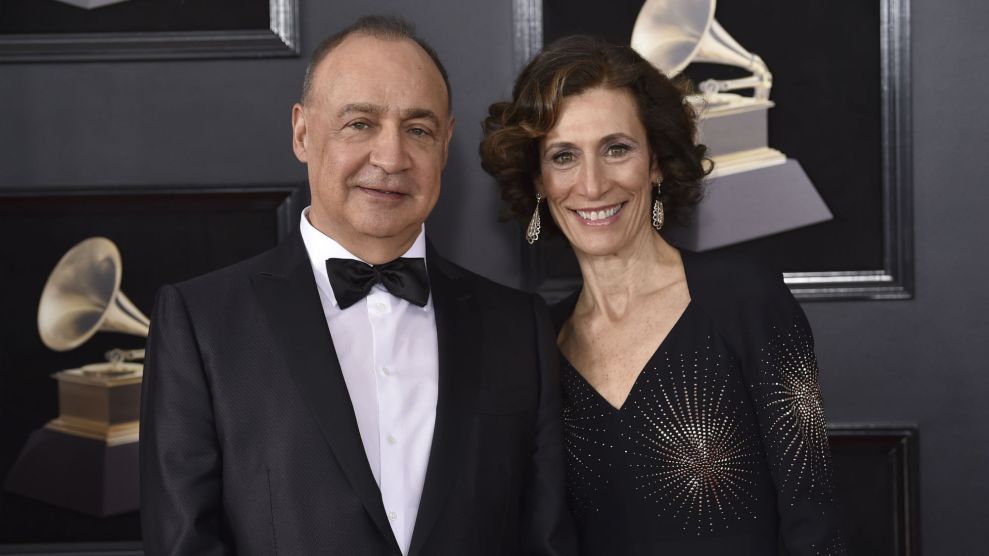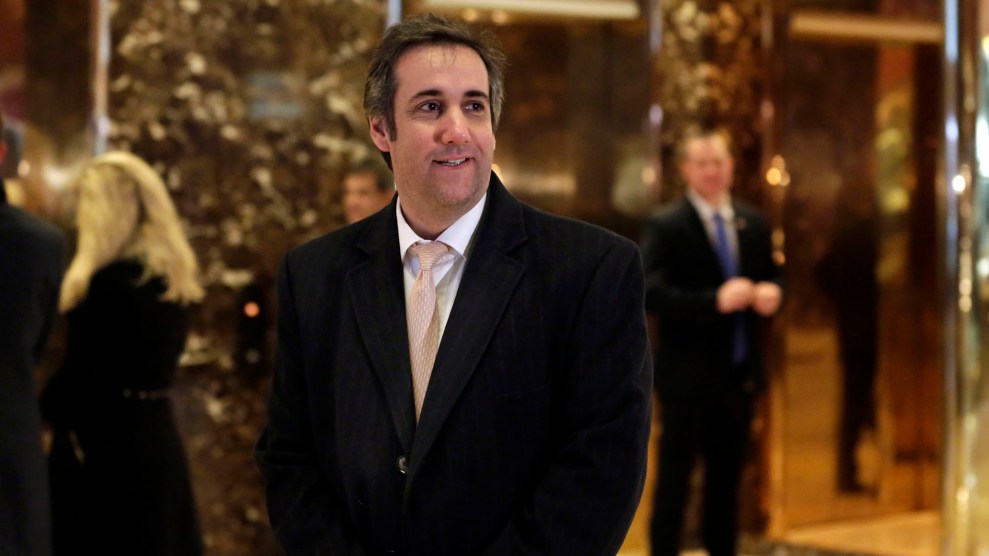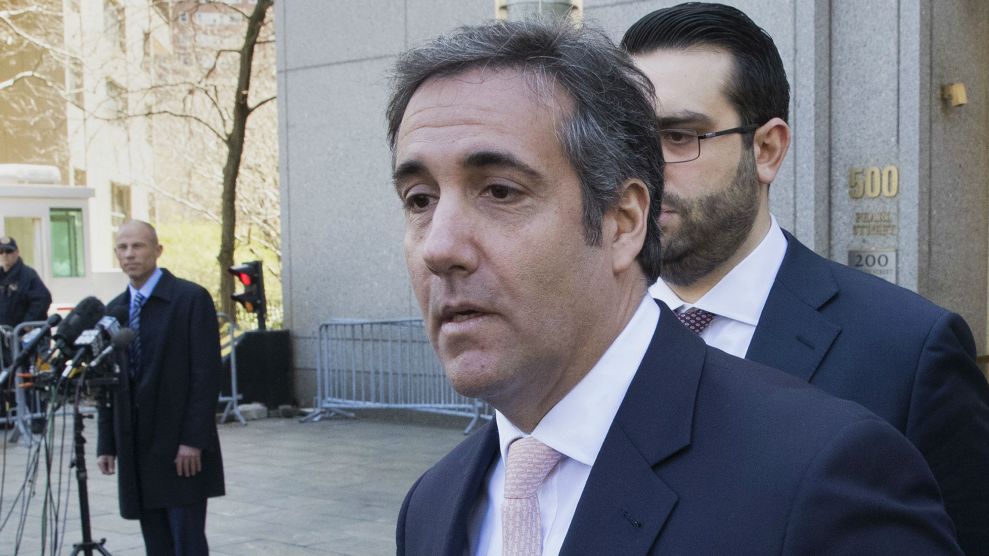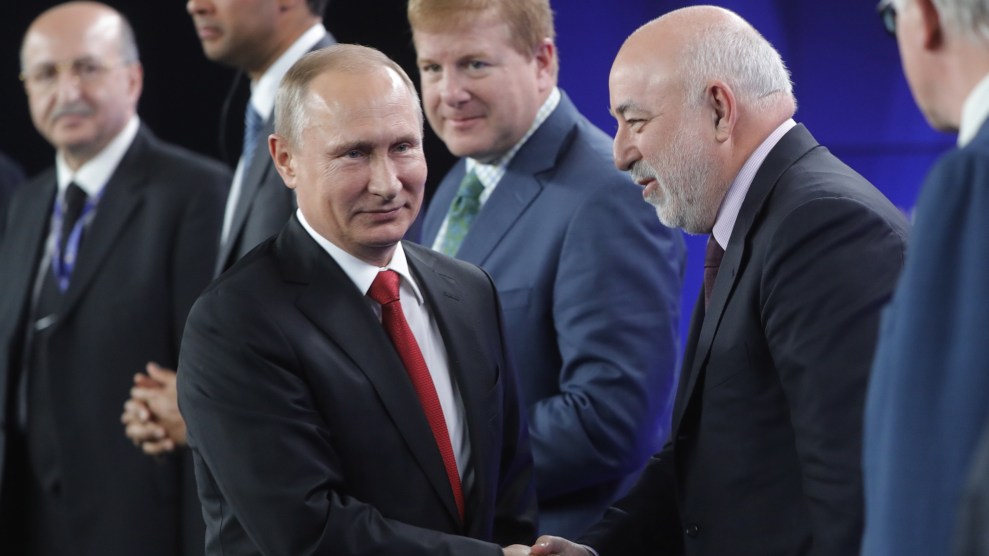
Len Blavatnik and his wife Emily Appelson at the Grammy Awards on Jan. 28, 2018.Evan Agostini/Invision/AP
The Council on Foreign Relations, a think tank known as a bastion of the bipartisan US foreign policy establishment, is under fire from its own members and dozens of international affairs experts over its acceptance of a $12 million gift to fund an internship program from Leonard Blavatnik, a Ukrainian-born billionaire with longstanding ties to oligarchs close to Russian President Vladimir Putin. The dispute makes the think tank the latest institution to face criticism for taking money from Blavatnik, a British and American citizen whose fortune stems from privatization of Russian aluminum and other natural resources in the 1990s—now notorious as a corrupt giveaway.
“It is our considered view that Blavatnik uses his ‘philanthropy’—funds obtained by and with the consent of the Kremlin, at the expense of the state budget and the Russian people—at leading western academic and cultural institutions to advance his access to political circles,” 55 international relations scholars and Russia experts wrote in a September 18 letter to the organization’s board and CFR’s president, Richard Haass. “Such ‘philanthropic’ capital enables the infiltration of the US and UK political and economic establishments at the highest levels. It is also a means by which Blavatnik exports Russian kleptocratic practices to the West.”
“We regard this as another step in the longstanding effort of Mr. Blavatnik—who…has close ties to the Kremlin and its kleptocratic network—to launder his image in the West,” the letter says.
Five of the letter’s signatories are among the nearly 5,000 members of the think tank, a membership-based publisher of Foreign Affairs magazine and think tank. The lead authors of the letter are Ilya Zaslavskiy, a researcher at the Free Russia Foundation, who heads an initiative focused on documenting Kremlin corruption, and Sarah Chayes, author of a book on international corruption. Other signatories include Michael Carpenter, a former deputy assistant for defense with responsibility for Russia and Ukraine, David Kramer, former assistant secretary of state for democracy, Daria Kaleniuk, a prominent anti-corruption activist in Ukraine, and Garry Kasparov, the former chess champion and Russian opposition activist.
In a response to that letter, Haass, who served as the State Department’s director of policy planning under President George W. Bush, wrote that Blavatnik, like other CFR donors “has no say” in picking interns or directing research. “The Blavatnik Family Foundation has also made transformational gifts to Harvard, Yale, and Tel Aviv Universities, and established the Blavatnik School of Government at Oxford University,” Haass added. “We are proud to find ourselves in such distinguished company.”
In another letter addressing that argument, Zaslavskiy, Chayes and Peter Reddaway, a political science professor at George Washington University, wrote: “The fact that Harvard or Yale’s due diligence failed…does not excuse this more serious lapse.”
This exchange highlights the difficulty posed by Blavatnik, who Forbes ranked in March as the 59th richest person in the world and who claims to have dispensed more than $700 million to more than 250 nonprofit institutions over the last decade. The origin of Blavatnik’s wealth and his continued ties to sanctioned oligarchs open him to criticism. But his status as a prominent American and British citizen, his transition into the ranks of rich respectability, along with his deployment of public relations firms, have helped him avoid the label of “oligarch” and the clear Kremlin ties typical for those operating primarily in Russia.
Blavatnik, who came to the United States in the late 1970s and now lives mostly in London, is a graduate of Columbia University and Harvard Business School. He is best known these day as the owner of the Warner Music Group. He regularly attends the Grammy Awards.
But his fortune stems from the privatization of industries in the former Soviet Union, in particular aluminum and oil. He was among the victors in Russia’s so-called “aluminum wars,” the sometimes murderous competition for control of Russian aluminum assets in the early 1990s. (Blavatnik has not been personally accused of violence). In 1996, Blavatnik partnered with Viktor Vekselberg, an oligarch tied to Putin, in SUAL Partners, which owns about one quarter of Rusal, the aluminum conglomerate long controlled by Oleg Deripaska. Both Vekselberg and Derispaska have been sanctioned by the Treasury Department for using their assets to advance Russian foreign policy interests, including interference in the 2016 election.
Blavatnik, long a prolific donor to both Democrats and Republicans, veered sharply toward the GOP in 2016 and 2017, giving $3.5 million to a super PAC tied to Senate Majority Leader Mitch McConnell, among others. Through his holding company, Access Industries, Blavanik, also gave $1 million to President Donald Trump’s Inaugural Committee. These gifts drew suspicion that Blavatnik was helping to advance Russian efforts to win influence with the Trump and the GOP, allegations Blavatnik denies. ABC News reported last year that former special counsel Robert Mueller had investigated Blavatnik’s inaugural contributions, along with donations by Vekselberg’s cousin, Andrew Intrater, the head of an American venture capital fund that long counted Vekselberg as its chief investor.
Blavatnik’s support for the McConnell-linked PAC drew notice this year when Rusal announced plans to invest $200 million in an aluminum plant in Kentucky. The announcement came after McConnell helped to block a bill that would have faulted the Trump administration for lifting US sanctions on Rusal.
More recently, Blavatnik has given lavishly to Democrats. He and his wife gave a combined $250,000 to the Democratic Congressional Campaign Committee in June, following donations of around $234,000 to the DCCC in 2018. The DCCC did not respond to multiple requests for comment. Backing incumbents and the parties in control of both chambers of Congress, Blavatnik seems to be supporting the status quo in Washington.
Blavatnik has consistently denied any political affiliation with Russia. In a statement, an Access Industries spokesman said: “Mr. Blavatnik has been an American citizen since 1984 and has, for more than a decade, donated to both Democratic and Republican parties, as well as to individual candidates who promote a pro-business, pro-Israel agenda. His donations are a matter of public record and comply with all legal requirements. He has no dealings with the Russian government or its leaders.”
Controversy over Blavatnik’s gift to CFR follows similar reactions to his gifts to other organizations. Oxford University, and London’s Victoria and Albert Museum have defended decisions to name facilities after Blavatnik. Harvard Medical School houses 11 basic and social science departments in the Blavatnik Institute, the result of a $200 million dollar gift last year. The school has shrugged off a smattering of criticism for this, including one alumnus who called the school accepting the money “appalling” due to Blavatnik’s history of deals with “individuals with checkered pasts, deep Kremlin ties and a reputation for corruption.”
The only organization that seems to have returned Blavatnik’s money is the right-leaning Hudson Institute. Last year, Charles Davidson, stepped down as head of the Kleptocracy Initiative, a Hudson effort to study how corruption and illicit financial flows threaten US democracy, saying he made that decision after learning that the think tank had accepted $25,000 from Blavatnik. “Blavatnik is precisely what the Kleptocracy Initiative is fighting against—the influence of Putin’s oligarchs on America’s political system and society—and the importation of corrupt Russian business practices and values,” Davidson told the New York Post. After that article, the organization returned the donation to Blavatnik, according to a person close to Hudson. A Hudson spokeswoman declined to say when the gift was returned or to comment on it.
Blavatnik’s businesses have been faulted for questionable practices. His firms have been accused of abusing the federal bankruptcy process, and was fined by the Federal Trade Commission in 2016 for violating anti-trust laws by repeatedly failing to report stock purchases within a required timeframe. But that record is not abnormal among corporate chiefs. And he has never been charged with a crime.
There is little evidence that Blavatnik, through his donations, is purposefully advancing Russian interests. He is seemingly engaged instead in a bid to use a large amount of questionably obtained money to buy influence and prestige. Leading US institutions have little problem benefiting from that. That’s a pretty American issue.
*This article has been updated to reflect that the Hudson Institute returned $25,000, not $50,000, donated by Leonard Blavatnik.
Read the September 18 letter to the Council on Foreign Relations regarding Blavatnik:
Read Haass’ September 26 response:
Read critics’ September 30 response to Haass:
















